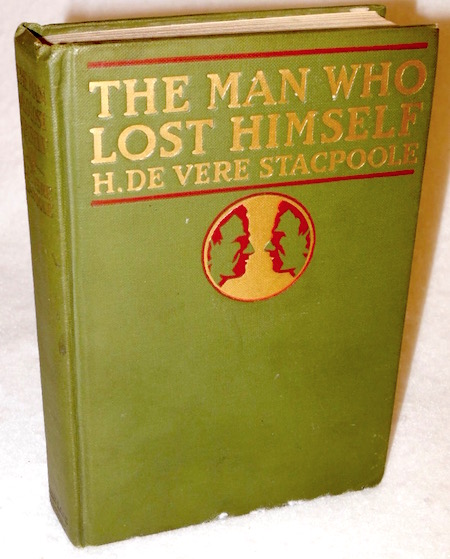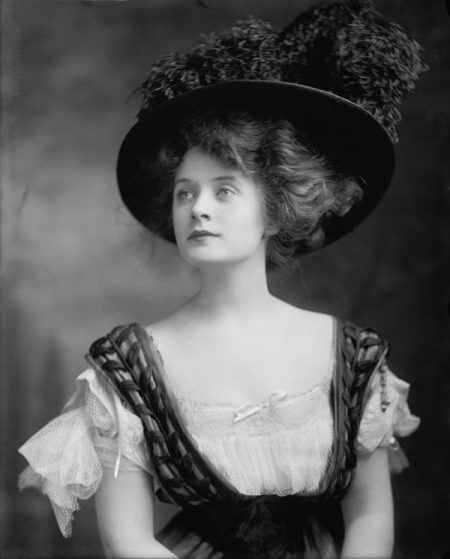THE MAN WHO LOST HIMSELF (30)
By:
October 9, 2018

This year marks the 100th anniversary of a forgotten Avenger/Artful Dodger-type adventure novel, The Man Who Lost Himself. A man down on his luck wakes up after a drunken night in London only to discover… that he has somehow slipped into the identity of a wealthy aristocrat! HiLoBooks is pleased to serialize this funny, thrilling yarn by H. De Vere Stacpoole — best known as author of The Blue Lagoon — here at HILOBROW.

When things are piled one on top of another beyond a certain height, they generally come down with a crash.
That one word “Sunday” was the last straw for Jones, sweeping away breakfast, bank and everything; coming on top of the events of the last twenty-four hours, it brought his mental complacency to ruin, ruin from which shot blazing jets of wrath.
Red rage filled him. He had been made game of, every man and everything was against him. Well, he would bite. He would strike. He would attack, careless of everything, heedless of everything.
A mesmerised looking taxi-cab, crawling along on the opposite side of the way, fortunately caught his eye.
“I’ll make hay!” cried Jones, as he rushed across the street. He stopped the cab.
“10A, Carlton House Terrace,” he cried to the driver. He got in and shut the door with a bang.
He got out at Carlton House Terrace, ran up the steps of 10A, and rang the bell.
The door was opened by the man who had helped to eject Spicer. He did not seem in the least surprised to see Jones.
“Pay that taxi,” said Jones.
“Yes, my Lord,” replied the flunkey.
Jones turned to the breakfast-room. The faint smell of coffee met him at the door as he opened it. There were no servants in the room. Only a woman quietly breakfasting with the Life of St. Thomas à Kempis by her plate.
It was Venetia Birdbrook.
She half rose from her chair when she saw Jones. He shut the door. The sight of Venetia acted upon him almost as badly as the word “Sunday” had done.
“What are you doing here?” said he. “I know — you and that lot had me tucked away in a lunatic asylum; now you have taken possession of the house.”
Venetia was quite calm.
“Since the house is not yours,” said she, “I fail to see how my presence here affects you. We know the truth. Dr. Simms has arrived at the conclusion that your confession was at least based on truth. That you are what you proclaimed yourself to be, a man named Jones. We thought you were mad, we see now that you are an impostor. Kindly leave this house or I will call for a policeman.”
Jones’ mind lost all its fire. Hatred can cool as well as inflame and he hated Venetia and all her belongings, including her dowager mother and her uncle the duke, with a hatred well based on reason and fact. All his fear of mind disturbance should he go on playing the part of Rochester had vanished, the fires of tribulation had purged them away.
“I don’t know what you are talking about,” said he. “Do you mean that joke I played on you all? I am the Earl of Rochester, this is my house, and I request you to leave it. Don’t speak. I know what you are going to say. You and your family will do this and you will do that. You will do nothing. Even if I were an impostor you would dare to do nothing. Your family washing is far, far too much soiled to expose it in public.
“If I were an impostor, who can say I have not played an honourable game? I have recovered valuable property — did I touch it and take it away? Did I expose to the public an affair that would have caused a scandal? You will do nothing and you know it. You did not even dare to tell the servants here what has happened, for the servant who let me in was not a bit surprised. Now, if you have finished your breakfast, will you kindly leave my house?”
Venetia rose and took up her book.
“Your house,” said she.
“Yes, my house. From this day forth, my house. But that is not all. To-morrow I will get lawyers to work and I’ll get apologies as big as houses from the whole lot of you — else I’ll prosecute.” He was getting angry, “prosecute you for doping me.” Recollections of the Barometer man’s advice came to him, “doping me in order to lay your hands on that million of money.”
He went to the bell and rang it.
“We want no scene before the servants,” said Venetia hurriedly.
“Then kindly go,” said Jones, “or you will have a perfect panorama before the servants.”
A servant entered.
“Send Church here,” said Jones. He was trembling like a furious dog.
He had got the whole situation in hand. He had told his tale and acted like an honourable man, the fools had disbelieved him and doped him. They had scented the truth but they dared do nothing. Mulhausen and the recovered mine, the Plinlimon letters, Rochester’s past, all these were his bastions, to say nothing of Rochester’s suicide.
The fear of publicity held them in a vice. Even were they to go to America and prove that a man called Jones exactly like the Earl of Rochester had lived in Philadelphia, go to the Savoy and prove that a man exactly like the Earl of Rochester had lived there, produce the clothes he had come home in that night — all of that would lead them, where — to an action at law.
They could not arrest him as an impostor till they had proved him an impostor. To prove that, they would have to turn the family history inside out before a gaping public.
Mr. Church came in.
“Church,” said Jones, “I played a practical joke on — on my people. I met a man called Jones at the Savoy — well, we needn’t go into details, he was very like me, and I told my people for a joke that I was Jones. The fools thought I was mad. They called in two doctors and drugged me and hauled me off to a place. I got out, and here I am back. What do you think of that?”
“Well, my Lord,” said Church, “if I may say it to you, those practical jokes are dangerous things to play — Lord Langwathby —”
“Was he here?”
“He came last night, my Lord, to have a personal explanation about a telegram he said you sent him as a practical joke, some time ago, taking him up to Cumberland.”
“I’ll never play another,” said Jones. “Tell them to bring me some breakfast, and look here, Church, I’ve told my sister to leave the house at once. I want no more of her here. See that her luggage is taken down at once.”
“Yes, my Lord.”
“And see here, Church, let no one in. Lord Langwathby, or anyone else. I want a little peace. By the way, have a taxi sent for, and tell me when my sister’s luggage is down.”
In the middle of breakfast, Church came in to say that Miss Birdbrook was departing and Jones came into the hall to verify the fact.
Venetia had brought a crocodile skin travelling bag and a trunk.
These were being conveyed to a taxi.
Not one word did she say to relieve her outraged feelings. The fear of a “scene before the servants” kept her quiet.
SERIALIZED BY HILOBOOKS: Jack London’s The Scarlet Plague | Rudyard Kipling’s With the Night Mail (and “As Easy as A.B.C.”) | Arthur Conan Doyle’s The Poison Belt | H. Rider Haggard’s When the World Shook | Edward Shanks’ The People of the Ruins | William Hope Hodgson’s The Night Land | J.D. Beresford’s Goslings | E.V. Odle’s The Clockwork Man | Cicely Hamilton’s Theodore Savage | Muriel Jaeger’s The Man With Six Senses | Jack London’s “The Red One” | Philip Francis Nowlan’s Armageddon 2419 A.D. | Homer Eon Flint’s The Devolutionist | W.E.B. DuBois’s “The Comet” | Edgar Rice Burroughs’s The Moon Men | Charlotte Perkins Gilman’s Herland | Sax Rohmer’s “The Zayat Kiss” | Eimar O’Duffy’s King Goshawk and the Birds | Frances Hodgson Burnett’s The Lost Prince | Morley Roberts’s The Fugitives | Helen MacInnes’s The Unconquerable | Geoffrey Household’s Watcher in the Shadows | William Haggard’s The High Wire | Hammond Innes’s Air Bridge | James Branch Cabell’s Jurgen | John Buchan’s “No Man’s Land” | John Russell’s “The Fourth Man” | E.M. Forster’s “The Machine Stops” | John Buchan’s Huntingtower | Arthur Conan Doyle’s When the World Screamed | Victor Bridges’ A Rogue By Compulsion | Jack London’s The Iron Heel | H. De Vere Stacpoole’s The Man Who Lost Himself | P.G. Wodehouse’s Leave It to Psmith | Richard Connell’s “The Most Dangerous Game” | Houdini and Lovecraft’s “Imprisoned with the Pharaohs” | Arthur Conan Doyle’s “The Sussex Vampire.”
RADIUM AGE SCIENCE FICTION: “Radium Age” is HILOBROW’s name for the 1904–33 era, which saw the discovery of radioactivity, the revelation that matter itself is constantly in movement — a fitting metaphor for the first decades of the 20th century, during which old scientific, religious, political, and social certainties were shattered. This era also saw the publication of genre-shattering writing by Edgar Rice Burroughs, Sax Rohmer, E.E. “Doc” Smith, Jack London, Arthur Conan Doyle, Aldous Huxley, Olaf Stapledon, Karel Čapek, H.P. Lovecraft, Charlotte Perkins Gilman, Yevgeny Zamyatin, Philip Gordon Wylie, and other pioneers of post-Verne/Wells, pre-Golden Age “science fiction.” More info here.
READ GORGEOUS PAPERBACKS: HiLoBooks has reissued the following 10 obscure but amazing Radium Age science fiction novels in beautiful print editions: Jack London’s The Scarlet Plague, Rudyard Kipling’s With the Night Mail (and “As Easy as A.B.C.”), Arthur Conan Doyle’s The Poison Belt, H. Rider Haggard’s When the World Shook, Edward Shanks’ The People of the Ruins, William Hope Hodgson’s The Night Land, J.D. Beresford’s Goslings, E.V. Odle’s The Clockwork Man, Cicely Hamilton’s Theodore Savage, and Muriel Jaeger’s The Man with Six Senses. For more information, visit the HiLoBooks homepage.
